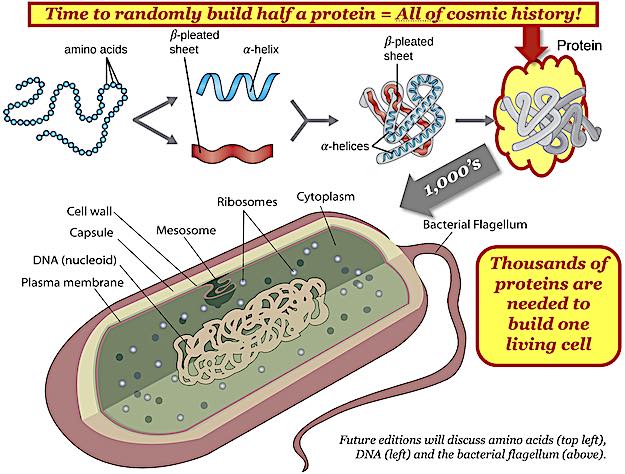Before we make further progress towards deflating evolution’s significance as even partially true, we need to address the seemingly untouchable argument of deep time. It goes like this: although the odds for evolving life are small, given billions of years across the cosmos, small odds multiplied by deep time equals high probability. It’s almost as if they’re mocking God, when He asks: Who hath measured the waters in the hollow of his hand, and meted out heaven with the span, and comprehended the dust of the earth in a measure, and weighed the mountains in scales, and the hills in a balance? It appears hard to argue against – or so it seems.
Deep time is a major weakness for evolutionists. The truth is that there isn’t enough time in the universe —even given 13 billion years by their audacious claims— for undirected energy to form a single protein from raw matter through “random processes” [1]. In Darwin’s era of the late 1800’s, bacteria under their microscopes appeared as simple wiggly blobs. Today, scanning electron microscopes reveal protein-making factories (ribosomes), cell shape protectors (cell wall, cytoplasm), stringent border controls (plasma membrane), a protective army (plasma membrane), a city hall regulating activities via DNA blueprints (nucleoid), self-replication aids (mesosome), and powerful outboard engines (flagellum) to move it about. Living cells are more like a battleship than a blob, except a battleship can’t replicate itself.
Let’s evaluate the length of time required to randomly produce a protein, the most basic building block of all living cells (see yellow highlight, diagram)[2]. ICR’s Dr. Joseph Mastropaolo succinctly articulates the “search for the probability of creating a protein by mindless chance as specified by evolution. … The probability of evolving one molecule of iso-1-cytochrome c, a small protein common in plants and animals, is an astounding one chance in 2.3 times ten billion vigintillion. The magnitude of this impossibility may be appreciated by realizing that ten billion vigintillion is one followed by 75 zeros (1075). Or to put it in evolutionary terms, if a random mutation is provided every second from the alleged birth of the universe, then to date that protein molecule [is] only 43% of the way to completion.”

It gets worse, since any phenomena with extremely small probabilities do not occur. And what is that number? William Dembski “estimated 1080 elementary particles in the universe and asked how many times per second an event could occur. He found 1045. He then calculated the number of seconds from the beginning of the universe to the present and for good measure multiplied by one billion for 1025 seconds in all. He thereby obtained 1080 x 1045 x 1025 = 10150 for his Law of Small Probability.” [3] This means anything rarer than 1 in 10150 cannot occur. He also calculated the odds of randomly evolving one cell of 60,000 proteins in 100 different configurations at 1 in 104,478,296.
Evolution does not add up. We should believe the high and lofty One that inhabiteth eternity and says, I live for ever. Hast thou not heard, that the everlasting God, the Lord, is the Creator? He is the Ancient of Days, the everlasting God, the Alpha and Omega, the first and the last. He is the “deep time” in whom we should trust.
[1] Processes are, by definition, repeatable and predictable, not random. Such illogical phrases are common in the evolutionary scientist’s dictionary.
[2] Diagrams extracted and compiled from CourseHero and Wikimedia.
[3] Source of all quotations: https://www.icr.org/article/evolution-biologically-impossible/. This entire article is a must-read, along with Probability Order vs Evolution and Mathematical Impossibility of Evolution, also on ICR’s website.
Like this? Consider sharing it to Facebook by clicking the linked icon below.
